Caring for a parent or loved one with dementia can be a lonely experience, yet according to the Alzheimer’s Association, today 11 million Americans provide home care for people with Alzheimer’s or other dementias. Modern medical breakthroughs have extended life expectancy, but as we live longer, the prevalence of dementia and Alzheimer’s are increasing. In 2022, 1 in 9 people ages 65 and older (10.7%) had Alzheimer’s, which means an estimated 6.5 million older Americans are living with Alzheimer’s. The price of memory care is daunting, as full-time nursing home care ranges from $56,000 to $112,000 per year (or higher, depending on the region), which is prohibitively expensive for many families. In addition to the financial considerations, some families feel that their loved one will be most comfortable and well-cared for at home.
Family caretakers often feel isolated as they navigate the complexities of dementia, and this has been especially true during the pandemic. Below, four Marin County residents share their family’s experiences — the good, the bad, the touching, the difficult, and everything in between — of caring for an elderly parent with dementia or Alzheimer’s at home.
Zachary Cohn
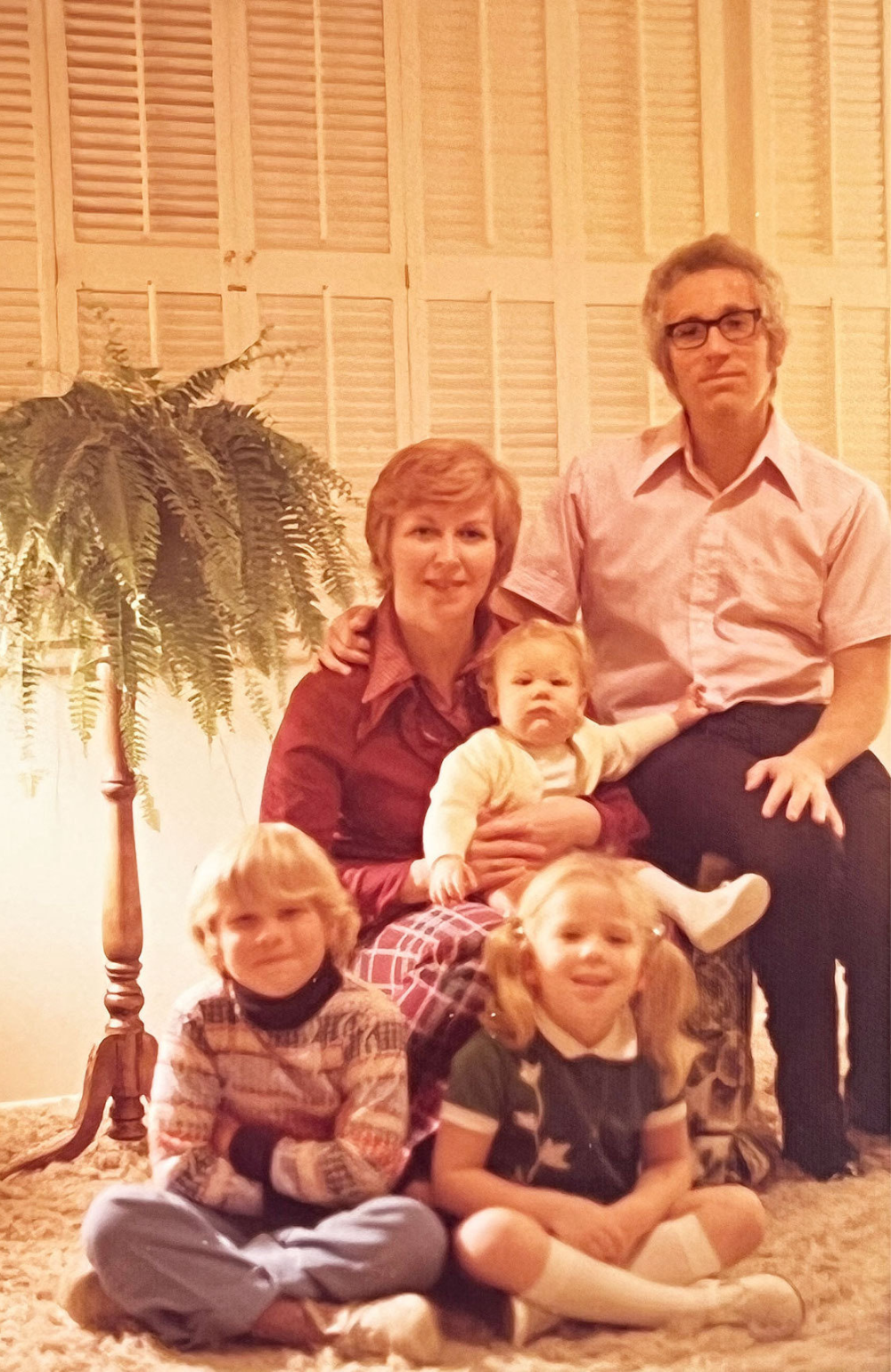
Janet Cohn of Tiburon was in her late 60’s when she was diagnosed with Alzheimer’s disease. That was 17 years ago and, until just five year ago, her husband Bruce Cohn was her primary caretaker. “My dad is 83 now,” says Zachary Cohn, a real estate agent based in Mill Valley. “From age 68 to almost 80 he cared for my mother in their home on his own. I lived in Sausalito, just ten minutes from their house, so I always supported them anyway I could, but eventually it became too physically challenging for my father. I realized it would not be a great ending for him. In fact, caregivers often pass away first.”
Three and a half years ago the younger Cohn rented out his Sausalito home and moved in with his parents to become their primary caretaker. “I had never been a caregiver, so it was trial by error, learn as you go,” says Cohn. “There have been a lot of challenges along the way, from incontinence to irritability, and other issues. And health issues develop in addition to Alzheimer’s, so you have to find the right food, sleep routines. I have had to learn and find a routine.”
The Cohns had researched senior care facilities, but found the costs for Janet’s needs to be extremely high. Because Zachary was single and lived nearby — his other two siblings live out of state — he was in a position to move in with parents. “I did it full time for several years before I sought outside support. I realized we needed to build a caregiving team.”
Janet Cohn’s neurologist at Dolby Brain Health Center in San Francisco referred the Cohns to a social worker who became an essential point person. They also turned to the Jewish Family and Children’s Services in San Rafael which has a Seniors at Home division offering non-medical homecare, skilled nursing care, counseling services and more. Zachary Cohn’s words of advice for others in the same position? “Look to outside resources for caregiving assistance. Build a caretaking village, because a caregiver will run out of steam.”
Now Bruce Cohn, a retired dermatologist, has his son’s companionship and is able to relax and enjoy himself more. And although Zachary’s mother does not know who her son is, she appreciates his presence. “With Alzheimer’s, even though your loved one doesn’t remember you, when they are comfortable with their environment and the people around them, it keeps them more relaxed,” says Cohn. Now Cohn tucks his mother into bed every evening, describing the experience as a role reversal — as if he is now the parent. “For me, I will always look back and be grateful for this experience. This is the greatest thing I can provide for my parents as their son. I recognize I am fortunate to be in a position to do this and my perspective is that it is the least I can do.”
Marianne Hill
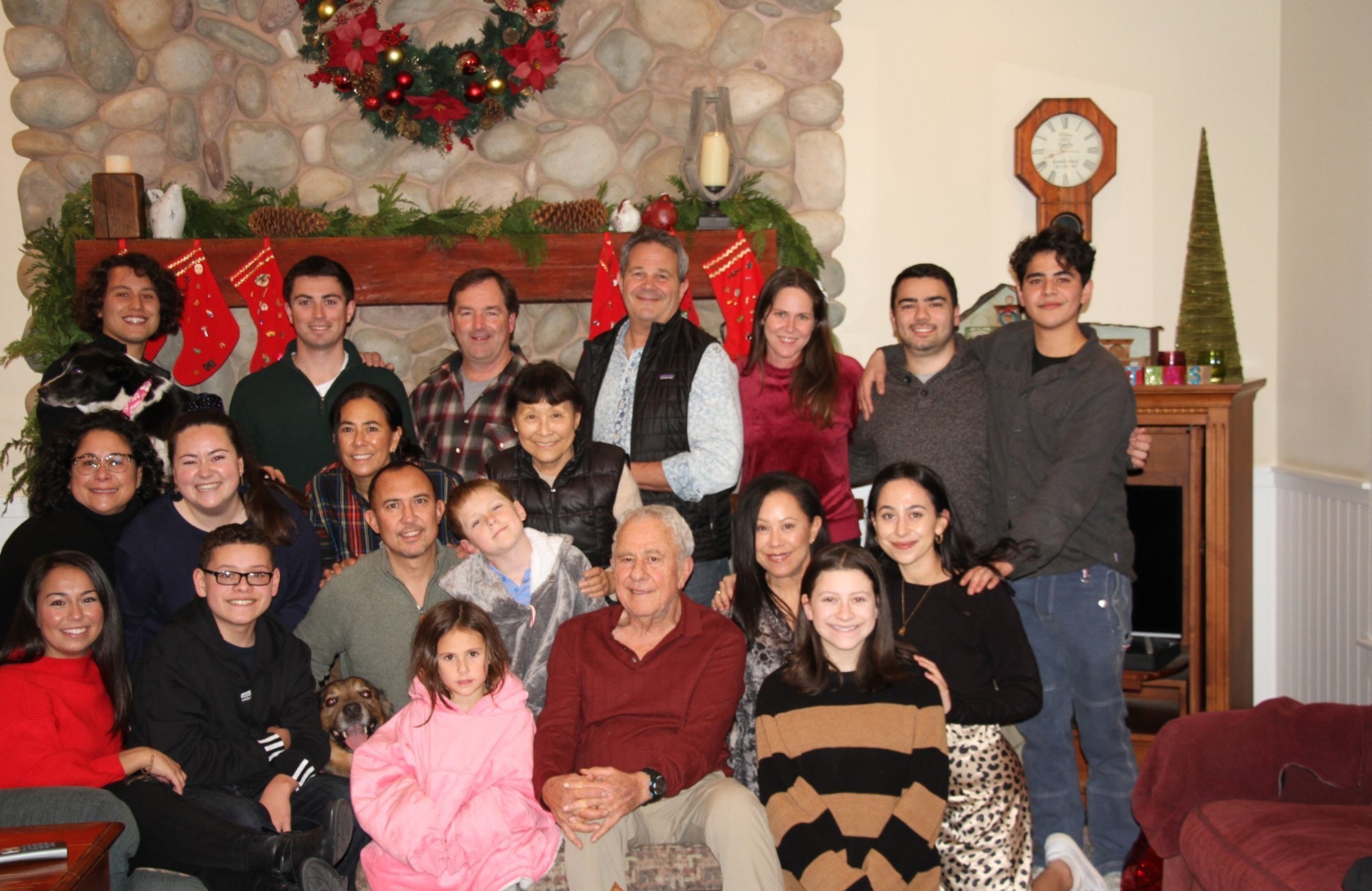
Marianne Hill and her husband Craig were also fortunate, in that their Novato property had room for a second unit for Marianne’s parents, Ray and Katsuko Minutoli, both 79. “We started talking with my parents ten years ago, but honestly, we had kicked the can down the road. Then it reached a state of crisis.” Ray Minutoli had developed signs of dementia and the adult children realized that their mother could no longer care for their father alone. “It became clear what we had to do,” Hill says. “We sold their home and used the proceeds to build a place for my parents. We did it out of necessity, but it was met with some resistance.”
When he was 59, Ray Minutoli had an accident that resulted in a traumatic brain injury. From that point on he had short term memory and balance issues, and his successful business suffered. In 2016, in his early 70’s, his health deteriorated significantly. “My father had the signs of dementia, but my mother always felt optimistic. She thought that there was more to do — she didn’t want to leave their home,” says Hill. “Even after the sale of their house my parents didn’t have much money, so their choices were extremely limited. A retirement community was not an option.”
Now that her parents have moved into the one bedroom second unit the family built, Marianne Hill says they are all working to set up routines and a care schedule. Her father has aged more rapidly than her mother, and they must balance her mother’s desire for independence and privacy with the need to manage her father’s pressing health issues, especially after a recent stroke. One issue is that the elder Minutolis moved out of a large home and Katsuko wants to have the books and other family heirlooms she is attached to in their new home. “These are items that make her feel like she is at home, someplace she belongs,” says Hill. But the place is too small for these things, says Hill, especially because her father has a wheelchair and a walker. She is working with her mother to clear more space. “In a sense, I’ve become the bad guy who makes things happen. When your parents go to a facility, you can relieve yourself of some of that responsibility,” says Hill. “It is not easy to navigate day by day, and it can be hard to always be as good-natured as I would like to be.”
At the same time, Hill says, she and her close knit extended family would not have it any other way. She and her siblings are grateful that the grandchildren spend time with their grandparents. “There is so much good about them spending time with their grandparents,” says Hill. “And now my parents have a home they will never have to leave.”
Randy Lakritz
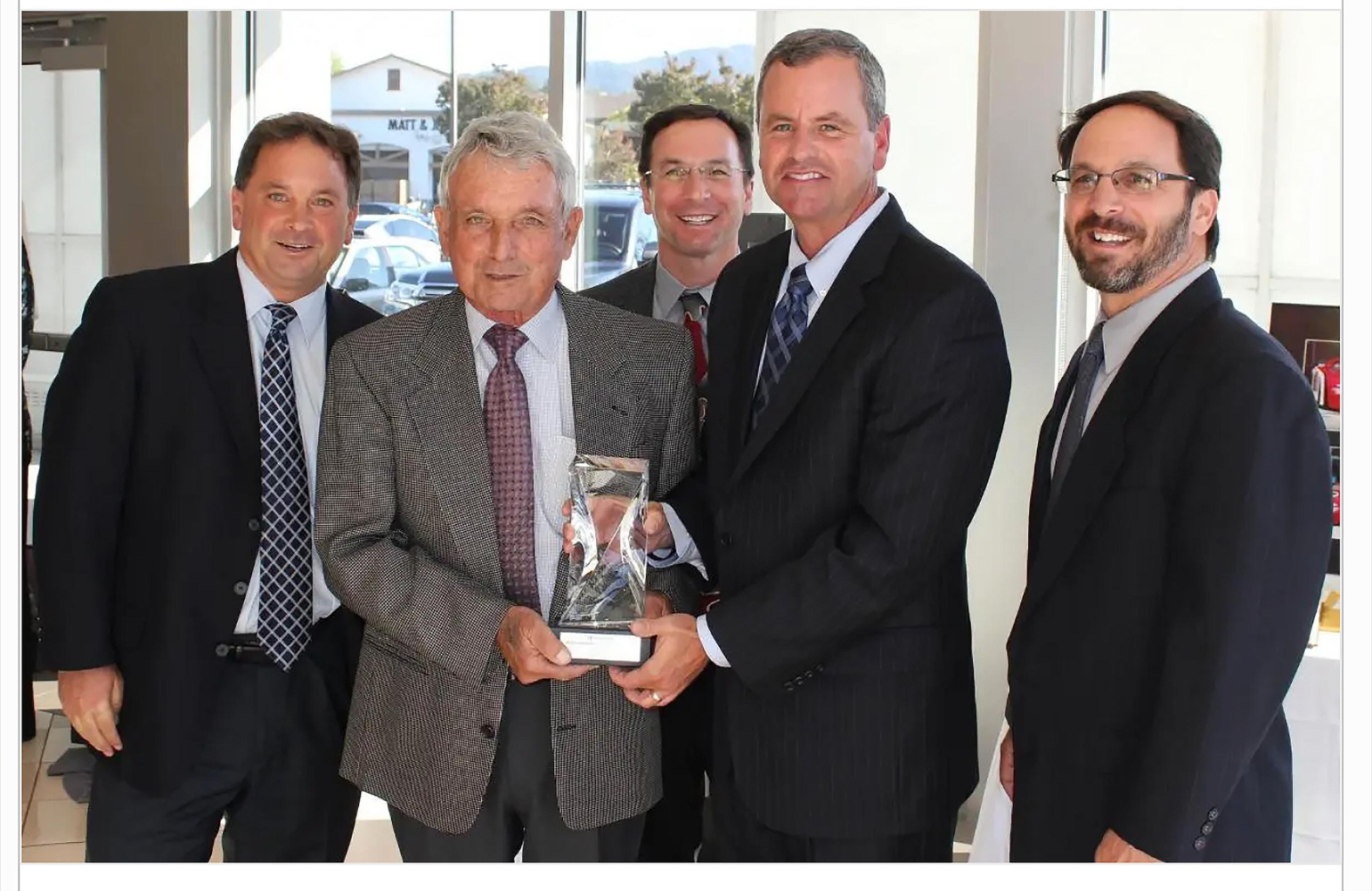
In 1984, CPA Herb Lakritz bought the Novato Toyota dealership. In the years that followed he expanded the business and moved from Redwood Boulevard to a larger spot on Vintage Way across from Vintage Shopping Center. Novato Toyota was a family run business and Lakritz’s sons — Randy, Barry and Geoff — spent summers working for their father. “Growing up, I washed cars, drove the parts van, jobs like that, all summer long,” says Randy Lakritz, who went to college at UC Davis and graduated in 1992 in the midst of a recession. “When I graduated the job market was not great,” says Randy. “My father said to me, ‘If you want a job, show up Monday morning,’ and the rest was history.” Randy Lakritz took a job in sales at Novato Toyota and is now the General Manager, while his brother Barry runs the adjacent KIA dealership, also part of the family business, and Geoff runs Parts and Service for both Toyota and Kia.
According to Randy Lakritz, his father Herb had always been especially sharp. As someone who moved from accounting into the car business, he was detail-oriented and great with numbers. “In his 70’s he began to miss things and would say, ‘My brain doesn’t work like it used to,’” says Lakritz. “He still knew what was happening every day, but at the same time he was actively integrating us into key decision making more and more. He’d say ‘XYZ is happening, what do you think?’” In his early 80’s, Herb Lakritz’s memory declined further and he was diagnosed with full-fledged Alzheimer’s disease.
Joyce Lakritz, Randy’s mother, was determined to care for her husband at home. Because of her strength (Randy describes his mother as the strongest person her age he’s ever known), and because all three of her sons live nearby to support her, she was able to manage Herb’s care at home. “My mother is an unbelievable person. She would not leave his side,” says Randy Lakritz.
As the disease progressed Herb Lakritz started sleeping more and more, sometimes 18 hours a day, and Joyce would never leave his side. Eventually the family hired a caretaker to help give Joyce four hour breaks. As bathroom and night time care issues increased, the family made the difficult decision to move Herb into memory care at Oakmont of Novato this past fall. “It was very difficult for all of us,” says Randy. “And still, my mom felt guilty leaving my father. She brought him food every day. We wanted her to not feel that way. It was too much for her.”
When Herb moved to Oakmont, he had the additional support of hospice for palliative care, and the brothers focused on giving their mother comfort. “My brothers are so supportive,” says Randy Lakritz. “I realized the best thing I could do for my mom was just listen to her.” Herb Lakritz passed away in October, a great loss for the family and the community, and also, Randy Lakritz says, a relief because his father was no longer suffering. “I know that us being there gave my mother comfort,” says Randy. “Watching this up close was very difficult for all of us.”
Megan Keane Tuggle
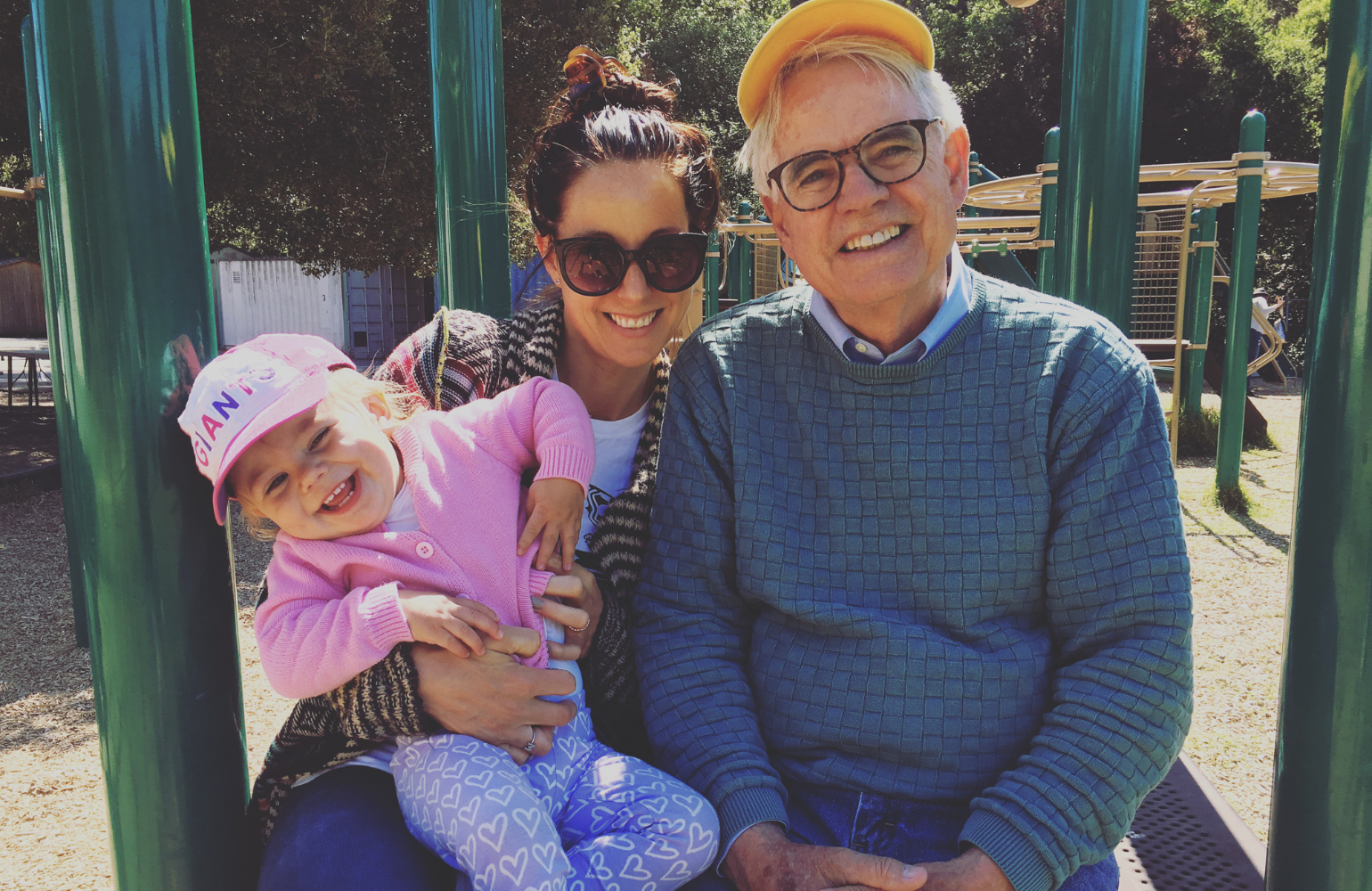
Megan Keane Tuggle’s father, John Keane, was just 72 when he was diagnosed with Alzheimer’s, and passed last August at the age of 76. “He had been very healthy, and then had a very rapid decline,” says Tuggle. With family support and resources for caretaking help, John Keane was able to stay at home with his wife, Tuggle’s stepmother, through the end of his life.
“My father had a rare scenario where he lost his speech early on, so he was limited to a handful of words, just two or three words,” says Tuggle. “One phrase was ‘thank you,’ because he was always so polite. Another was ‘forty-niners’ — he was a lifelong fan. He used these words to communicate along with nonverbal cues. It was remarkable.”
The Keane family lived in Sleepy Hollow for 44 years. John Keane’s first wife, Sandy, Megan Tuggle’s mother, passed away at a young age, and Keane finished raising his four kids on his own. As adults, the children remained in the area, less than an hour away from their father, which meant they were able to be involved in supporting him and their stepmother through his illness.
When John Keane was first diagnosed, the family turned to the local chapter of the Alzheimer’s Association in Terra Linda. The association provided contacts for resources like field trips, but then Covid struck and those options disappeared. “We didn’t want him to be isolated, so there were lots of regular visits, and all of our family events were at his house,” says Tuggle. “We had him at mostly all my son’s sporting events. My father could feel all the love; we kept him going to mass, and he was a lifelong musician so he would sing along to all the songs. He couldn’t speak, so it was amazing to hear him sing.”
John Keane had enough savings so that he was able to stay at home with as much caretaking as was needed at each stage of the disease progression. “We found caretakers through word of mouth,” says Tuggle. “At first it was three-hour shifts, then six-hour shifts and eventually it became 24-hour care. The caretakers taught us a lot and became part of the family — we couldn’t have done it without them.”
For Tuggle, one of the most beautiful parts of being with her father as he declined was watching his relationship with her children and how comfortable they were spending time with their grandfather, despite his illness. “My five-year-old daughter would climb all over him. My nine-year-old son had a special bond with him,” says Tuggle. “It was inspiring to see how his grandkids rose to the occasion. They had no judgment and no fear when they were with him.”
Tuggle describes her father as “a man of grace” who took his diagnosis in stride, and says she tried to follow his lead. “You can either think, this is so sad, or you can be in it and give them what they gave to you,” she says. “Of course it was alarming, and hard to watch and process, but at the same time, it was just part of our journey. He was an outstanding man.”
Local Resources
Alzheimer’s Association — North Bay
Provides information and referral, care, consultation, support groups and education for those living with Alzheimer’s disease or related dementia and their family members. The Alzheimer’s Association also provides a 24/7 Helpline with reliable information and support. 4340 Redwood Hwy Ste D314, San Rafael.
Seniors At Home, a division of Jewish Family and Children’s Services (JFCS)
Seniors At Home provides comprehensive services to seniors and their families who live in Sonoma, Marin, and San Francisco counties, as well as on the Peninsula. It serves people of all faiths and socioeconomic backgrounds and offers non-medical homecare, geriatric care management, skilled nursing care, palliative care, dementia care, fiduciary services, conservatorship, counseling services, and more. 600 Fifth Ave, San Rafael.
Family Caregiver Alliance
Provides services to persons who are caring for a loved one with an adult-onset neurological impairment including stroke, Alzheimer’s, Parkinson’s. Family Caregiver Alliance (FCA) supports and assists caregivers through education, research, services and advocacy. Part of California’s statewide system of 11 nonprofit Caregiver Resource Centers, FCA offers information, education, publications, care planning, legal/financial consultations and respite assistance. 235 Montgomery St Ste 950, San Francisco.
By the Bay Health
Provides hospice, home health care, and palliative care services necessary for obtaining quality of life, including practical and emotional support to their families and caregivers. Founded in 1975 as Hospice of Marin, the organization was the first hospice in California, and only the second in the U.S. 17 Sir Francis Drake Blvd, Larkspur.
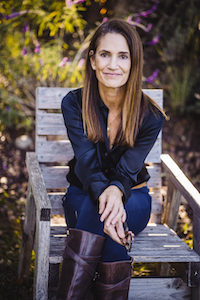
Kirsten Jones Neff is a journalist who writes about all things North Bay, with special attention to the environment and the region’s farmers, winemakers and food artisans. She also works and teaches in school gardens. Kirsten’s poetry collection, When The House Is Quiet, was nominated for the Northern California Book Award, and three of her poems received a Pushcart nomination. She lives in Novato with her husband and three children and tries to spend as much time as possible on our local mountains, beaches and waterways. For more on her work visit KirstenJonesNeff.Com.

